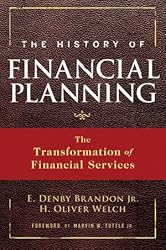Executive Summary
As George Santayana said, "Those who cannot remember the past are condemned to repeat it," but fortunately we don't need to remember the past ourselves, at least when it comes to financial planning. E. Denby Brandon, Jr., and H. Oliver Welch, have done it for us in their new book "The History of Financial Planning: The Transformation of Financial Services."
The History Of Financial Planning
As financial planning enters a time period with the potential for significant regulatory change in Washington, many debates emerge about what our goals should be for a regulatory outcome, and what we need to advance forward as a profession. However, navigating this path is made all the more difficult if we don't have an awareness of the financial planning's past and the ways these issues have been already explored.
 According, if you are a financial planner, you need to read "The History Of Financial Planning". There's really no other way to say it. Brandon and Welch's material provides a rich history of the roots of financial planning over the past 40 years, from its start at a meeting in Chicago in 1969 called together by pioneers Loren Dunton and James Johnston, to the development and evolution of the International Association of Financial Planners and the Institute of Certified Financial Planners, to their ultimate merger into the Financial Planning Association. The book explains the origins of the College for Financial Planning, the National Endowment for Financial Education (NEFE), and the CFP Board, and how and why these organizations evolved into the roles they play today within the profession.
According, if you are a financial planner, you need to read "The History Of Financial Planning". There's really no other way to say it. Brandon and Welch's material provides a rich history of the roots of financial planning over the past 40 years, from its start at a meeting in Chicago in 1969 called together by pioneers Loren Dunton and James Johnston, to the development and evolution of the International Association of Financial Planners and the Institute of Certified Financial Planners, to their ultimate merger into the Financial Planning Association. The book explains the origins of the College for Financial Planning, the National Endowment for Financial Education (NEFE), and the CFP Board, and how and why these organizations evolved into the roles they play today within the profession.
But perhaps even more importantly, the book provides rich information and context about the discussions that our profession has already engaged in for the better part of 40 years, from the debate about whether the CFP marks should be a central focus for defining ourselves as professionals, to how financial planning itself should be regulated and what role compensation
should or should not play, to the higher meaning and social purpose of financial planning in people's lives and what role it should play - reflecting not only on its role here in the United States, but its emergence in numerous countries around the world.
The coming years will be likely be an important transition period that set the stage for the next 40 years of financial planning. But to have the proper perspective on what may be coming, be certain you're read the history of where financial planning has been for the past 40 years!




